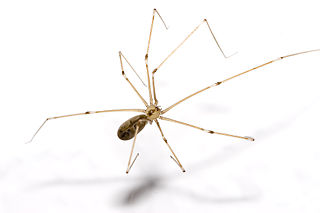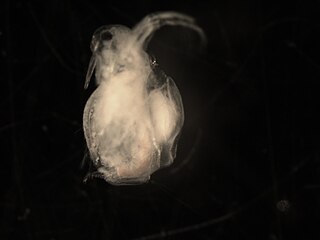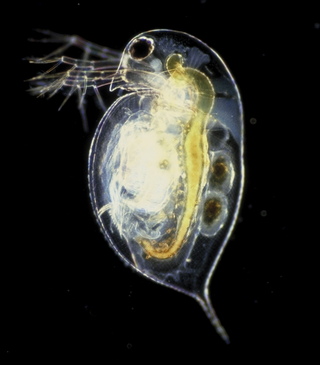
Branchiopoda is a class of crustaceans. It comprises fairy shrimp, clam shrimp, Diplostraca, Notostraca, the Devonian Lepidocaris and possibly the Cambrian Rehbachiella. They are mostly small, freshwater animals that feed on plankton and detritus.

Genus is a taxonomic rank above species and below family as used in the biological classification of living and fossil organisms as well as viruses. In binomial nomenclature, the genus name forms the first part of the binomial species name for each species within the genus.

Sylviidae is a family of passerine birds that includes the typical warblers and a number of babblers formerly placed within the Old World babbler family. They are found in Eurasia and Africa.

The Pholcidae are a family of araneomorph spiders. The family contains more than 1,800 individual species of pholcids, including those commonly known as cellar spider, daddy long-legs spider, carpenter spider, daddy long-legger, vibrating spider, gyrating spider, long daddy, skull spider, and angel spider. The family, first described by Carl Ludwig Koch in 1850, is divided into 94 genera.

Connaraceae is a pan-tropical plant family of 19 genera and more than 180 species of largely evergreen trees, woody shrubs and climbers.

The Encyclopedia of Life (EOL) is a free, online encyclopedia intended to document all of the 1.9 million living species known to science. It aggregates content to form "pages" for every known species. Content is compiled from existing trusted databases which are curated by experts and it calls on the assistance of non-experts throughout the world. It includes video, sound, images, graphics, information on characteristics, as well as text. In addition, the Encyclopedia incorporates species-related content from the Biodiversity Heritage Library, which digitizes millions of pages of printed literature from the world's major natural history libraries. The BHL digital content is indexed with the names of organisms using taxonomic indexing software developed by the Global Names project. The EOL project was initially backed by a US$50 million funding commitment, led by the MacArthur Foundation and the Sloan Foundation, who provided US$20 million and US$5 million, respectively. The additional US$25 million came from five cornerstone institutions—the Field Museum, Harvard University, the Marine Biological Laboratory, the Missouri Botanical Garden, and the Smithsonian Institution. The project was initially led by Jim Edwards and the development team by David Patterson. Today, participating institutions and individual donors continue to support EOL through financial contributions.

Eliza Griswold is a Pulitzer Prize–winning American journalist and poet. Griswold is currently a contributing writer to The New Yorker and a Distinguished Writer in Residence at New York University. She is the author of Amity and Prosperity: One Family and the Fracturing of America, which was awarded the Pulitzer Prize for general nonfiction and the Ridenhour Book Prize in 2019, and which was a 2018 New York Times Notable Book and a Times Critics' Pick. Griswold was a fellow at the New America Foundation from 2008 to 2010 and won a 2010 Rome Prize from the American Academy of Arts and Letters. She is a former Nieman Fellow and a current Berggruen Fellow at Harvard Divinity School, and has been published in The New Yorker, Harper's Magazine, and the New York Times Magazine.

The Diplostraca or Cladocera, commonly known as water fleas, is a superorder of small, mostly freshwater crustaceans, most of which feed on microscopic chunks of organic matter, though some forms are predatory.

Moina is a genus of crustaceans within the family Moinidae. The genus was first described by W. Baird in 1850. They are referred to as water fleas, but are related to the much larger Daphnia magna and the larger Daphnia pulex. This genus demonstrates the ability to survive in waters containing low oxygen levels, high salinity, and other impurities, including salt pans, and commonly eutrophication. An example of such an extreme habitat is the highly saline Makgadikgadi Pans of Botswana, which supports prolific numbers of Moina belli.

Daphniidae is a family of water fleas in the order Anomopoda.

The Ctenopoda are an order of the superorder Diplostraca, comprising the three families Holopediidae, Pseudopenilidae, and Sididae. Its members mostly live in fresh water, but Penilia is marine.

Sida is a genus of ctenopods in the family Sididae. There are about five described species in Sida.

Podonidae is a family of onychopods in the order Diplostraca. There are about 8 genera and at least 20 described species in Podonidae. A lot of them are non-native species, many of which pose a great threat to aquatic ecosystems.

Penilia avirostris is a species of ctenopod in the family Sididae. It is found in temperate Asia, Europe, and New Zealand.

Penilia is a genus of ctenopods in the family Sididae. There is one described species in Penilia, P. avirostris.

Holopedium gibberum is a species of water flea in the family Holopediidae, known for its gelatinous mantle. It is found in Europe, as well as throughout the Great Lakes Basin of North America.

Holopedium is the sole genus of water fleas in the family Holopediidae. There are about seven described species in Holopedium.

Sida crystallina is a species of ctenopod in the family Sididae. It is found in Europe.
Diaphanosoma is a genus of Sididae.
Alexander Straus is a Norwegian football coach. He has been the head coach of FC Bayern München's women's team since July 2022.














